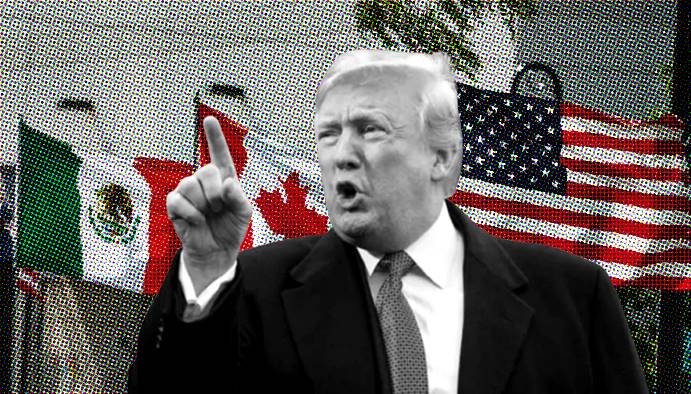Trump's Trade War With China: Examining The Consequences Of Tariffs On The US Economy

Table of Contents
The Rationale Behind the Tariffs
The Trump administration justified its tariffs on Chinese goods primarily by citing the need to address what it perceived as unfair trade practices. The stated goals included protecting American industries, combating intellectual property theft, and correcting what was seen as a significant trade imbalance. The administration argued that these measures were necessary to level the playing field and strengthen the US economy.
- Addressing the perceived unfair trade practices by China: This included accusations of forced technology transfer, intellectual property theft, and state-sponsored subsidies for Chinese businesses.
- Protecting American jobs in specific sectors: The administration targeted industries like steel, aluminum, and manufacturing, arguing that tariffs would safeguard American jobs from cheaper Chinese imports.
- Reducing the US trade deficit with China: A key objective was to shrink the substantial trade deficit the US had with China, aiming to achieve a more balanced trade relationship.
- Strengthening American manufacturing: The tariffs were presented as a way to revitalize American manufacturing by reducing reliance on Chinese imports and encouraging domestic production.
Economic Impacts of the Tariffs on US Businesses
While the intended effects of the tariffs were to bolster American industries, the reality for many US businesses was far more complex and often negative. The increased costs associated with tariffs, coupled with retaliatory measures from China, led to reduced competitiveness and significant supply chain disruptions.
- Increased prices for consumers due to higher import costs: Tariffs directly increased the cost of imported goods, leading to higher prices for consumers across various sectors.
- Reduced profits and competitiveness for US businesses relying on imported goods: Businesses that relied on imported components or raw materials from China faced significant increases in their production costs, impacting their profitability and competitiveness.
- Disruptions to supply chains due to trade restrictions: The trade war caused significant disruptions to global supply chains, leading to delays, shortages, and increased uncertainty for businesses reliant on international trade.
- Retaliatory tariffs imposed by China impacting US exports: China retaliated with its own tariffs on US goods, particularly impacting agricultural exports and other key sectors.
The Impact on American Consumers
The tariffs imposed during Trump's trade war with China significantly affected American consumers. Higher prices on imported goods led to reduced purchasing power and impacted consumer confidence.
- Increased prices for consumer goods due to tariffs: Consumers faced higher prices for a wide range of goods, from electronics and apparel to furniture and household items.
- Reduced consumer spending due to higher prices: The increased cost of living led to reduced consumer spending, impacting overall economic growth.
- Impact on specific sectors like electronics and apparel: These sectors were particularly hard-hit, as many products rely on components imported from China.
- Analysis of the overall effect on consumer confidence: The uncertainty and increased costs associated with the trade war negatively impacted consumer confidence, further dampening economic activity.
The Agricultural Sector and the Trade War
The agricultural sector bore a disproportionate brunt of the trade war. China's retaliatory tariffs on US agricultural products, particularly soybeans, caused significant hardship for American farmers.
- Significant losses for American farmers: American farmers experienced substantial losses due to reduced exports to China and depressed commodity prices.
- Government subsidies to mitigate losses: The government implemented various subsidy programs to help farmers cope with the financial fallout.
- Long-term effects on the agricultural industry's competitiveness: The trade war raised concerns about the long-term competitiveness of the US agricultural sector in the global market.
- Impact on rural economies: The financial distress of farmers had a ripple effect, negatively impacting rural communities and economies reliant on agriculture.
Long-Term Implications and Future Trade Relations
Trump's trade war with China had lasting consequences, significantly impacting US-China relations and the future of global trade. The increased uncertainty and strained diplomatic ties continue to pose challenges.
- Strained diplomatic relations between the US and China: The trade war significantly strained diplomatic relations between the two economic superpowers, creating an atmosphere of distrust and heightened tension.
- Increased uncertainty in global trade: The trade war highlighted the fragility of global supply chains and increased uncertainty for businesses engaged in international trade.
- Potential for future trade disputes: The experience of the Trump-era trade war underscores the potential for future trade disputes between the US and China, and other global economic actors.
- The need for more balanced and sustainable trade practices: The trade war underscored the need for a more balanced and sustainable approach to international trade, one that addresses concerns about fairness and competitiveness while minimizing disruption to global commerce.
Conclusion
Trump's trade war with China had profound and multifaceted consequences for the US economy. While intended to address perceived unfair trade practices and boost American industries, it resulted in increased costs for consumers, reduced competitiveness for some US businesses, and significant disruptions to global supply chains. The agricultural sector suffered disproportionately from China's retaliatory tariffs. The long-term effects include strained US-China relations and increased uncertainty in global trade. Understanding the full consequences of Trump's trade war with China requires ongoing analysis. Further research into the long-term implications of these policies is crucial for navigating future US-China trade relations. Continue your exploration of this complex issue by researching further using keywords like "Trump's trade policies," "China trade war analysis," and "US-China trade relations."

Featured Posts
-
 Texas Woman Dies In Wrong Way Collision Near Minnesota North Dakota Border
Apr 29, 2025
Texas Woman Dies In Wrong Way Collision Near Minnesota North Dakota Border
Apr 29, 2025 -
 Trump Supporter Ray Epps Defamation Lawsuit Against Fox News Jan 6th Falsehoods Allegations
Apr 29, 2025
Trump Supporter Ray Epps Defamation Lawsuit Against Fox News Jan 6th Falsehoods Allegations
Apr 29, 2025 -
 Mlb Scores Twins 6 Mets 3 Minnesota Takes Series Lead
Apr 29, 2025
Mlb Scores Twins 6 Mets 3 Minnesota Takes Series Lead
Apr 29, 2025 -
 Will Minnesota Film Tax Credits Attract More Productions
Apr 29, 2025
Will Minnesota Film Tax Credits Attract More Productions
Apr 29, 2025 -
 Chicagos Office Market Meltdown The Rise Of Zombie Buildings
Apr 29, 2025
Chicagos Office Market Meltdown The Rise Of Zombie Buildings
Apr 29, 2025
Latest Posts
-
 Murder Conviction After Deadly Teen Rock Throwing Incident
Apr 29, 2025
Murder Conviction After Deadly Teen Rock Throwing Incident
Apr 29, 2025 -
 Fatal Rock Throwing Teen Receives Murder Conviction
Apr 29, 2025
Fatal Rock Throwing Teen Receives Murder Conviction
Apr 29, 2025 -
 Rock Throwing Game Turns Deadly Teen Convicted Of Murder
Apr 29, 2025
Rock Throwing Game Turns Deadly Teen Convicted Of Murder
Apr 29, 2025 -
 Teens Rock Throwing Spree Ends In Murder Conviction
Apr 29, 2025
Teens Rock Throwing Spree Ends In Murder Conviction
Apr 29, 2025 -
 The Impact Of Zombie Office Buildings On Chicagos Real Estate Market
Apr 29, 2025
The Impact Of Zombie Office Buildings On Chicagos Real Estate Market
Apr 29, 2025
